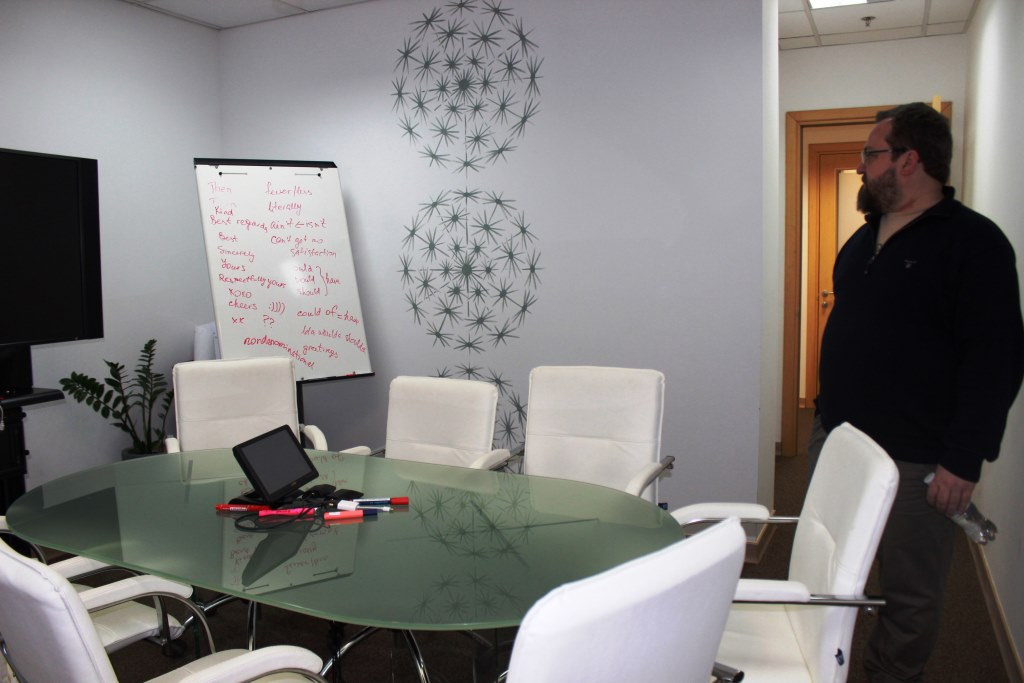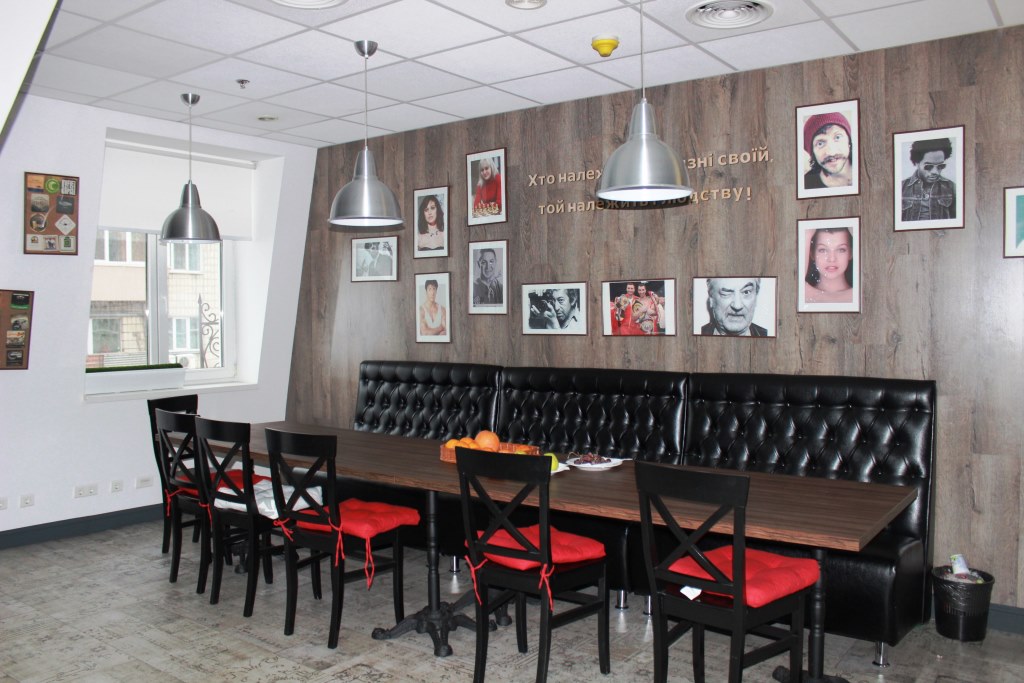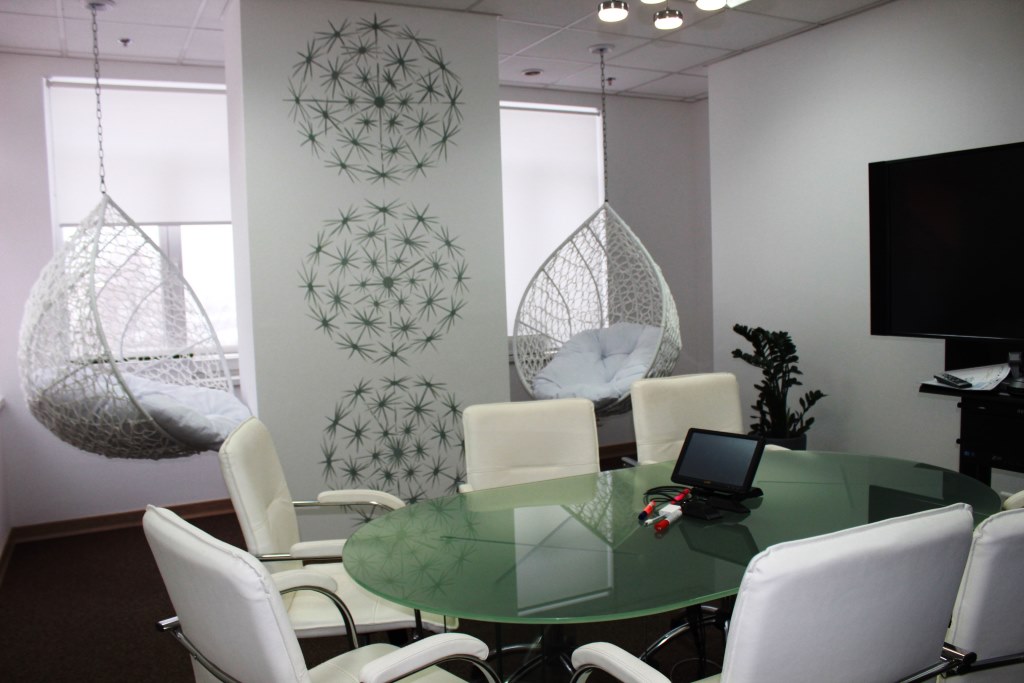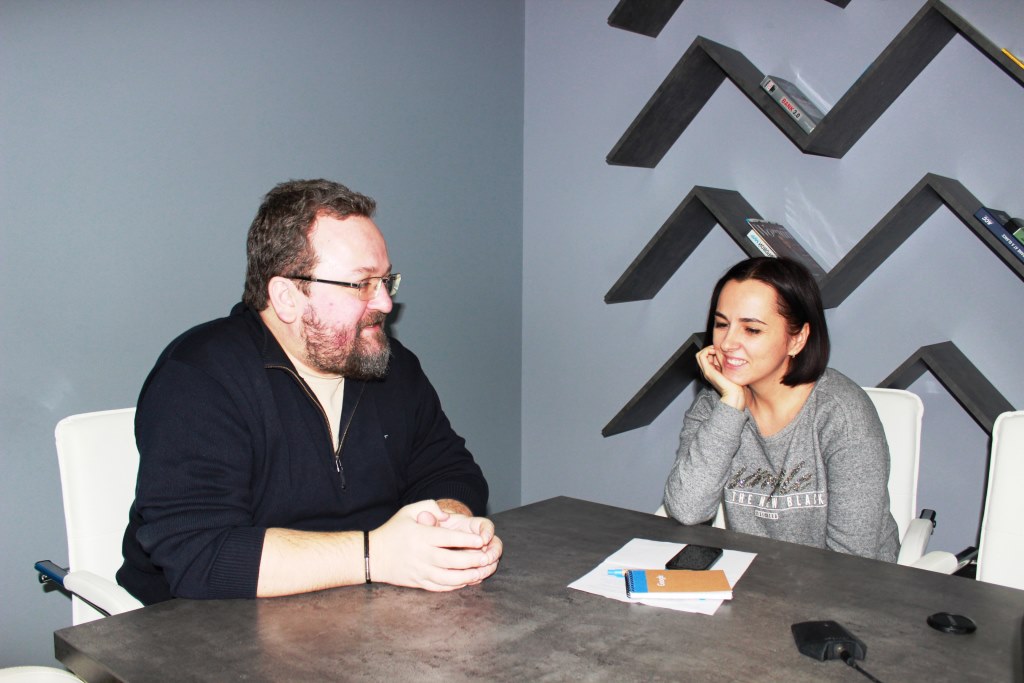Dmytro, it is the 10th year of Google in Ukraine, and all this time you’ve been the CEO of the company. What are the milestones in Google history in Ukraine in your opinion?
On July 1st it will be 10 years since I have been working in Google. Many things have happened since then. We will not mention the crises, it is not interesting. The really juicy ones are those Google developments that systematically changed our country, or moments of Ukraine’s history which influenced Google. The first thing that comes to my mind is a contest of young talents and future entrepreneurs that we organized with Marina in 2006 (Marina Tarasova is Communications and Public Affairs Manager at Google Ukraine). It was an experiment. Senior students had to come up with the idea of online service and based on it they had to make a business plan. I could not even think that the competition would be so massive, but in fact we got more than 60 projects. Very talented guys won this contest; one of them at the moment is a well-known in Ukraine Internet entrepreneur. We did not expect that these ideas would be implemented, that they would get funding, but it turned out that we opened bright talents and it made good waves on the market. Many people have realized that it is very important to support young talents and to look at new ideas. I think that in some way we have given impetus to Ukrainian start-up movement.
If we talk about the next step, I can say that we actually have positioned Ukraine as an innovative attractive country for Google. For the first time in Google history we settled the deals in this country with portals, which were the first ones in the world for Google. For example, we had the Ukrainian partner (it does not exist anymore); it was the largest company in the world in terms of gmail accounts and logs. We did this also with Privatbank. It still remains Google's biggest customer as to number of gmail boxes. For Google it was very important to see Ukraine on the world map. At about the same time (2007-2008) we’ve figured out how the export business, the one that produces something in Ukraine and sells this outside the country (I mean the services), works. And we got the first big customer, who worked in Kyiv, and sold services in the US and the UK. Thanks to those projects it became clear that in a short term Ukraine could be noticed and would attract investments. And it was the reason for Google to open the office here.
The launch of a service so important for the country, such as Google Maps, was probably the next important step. This is a great service which has helped foreigners, guests of our country, to understand what is going on here, where to go, what to do and so on. The project implementation phase took a year and a half; it was necessary to find reliable data providers, not just images. We’ve launched this service here in Ukraine, and now Zurich office runs it. It turned out that this launch gave an impetus to a large number of services, which then began to appear. “MapMaker”, "Google My Business" and many others are among them. It was quite a strong push for the
development of small and medium-sized businesses. Maps greatly changed everything being a basis for mobile searches.
YouTube in Ukraine was one more important step. In the beginning it was small, with no domain, but shortly after launch it became the fastest growing online resource in the region. At the moment Ukraine is one of the top countries in the world in terms of YouTube content generation volume. I am very happy. This has helped to perceive Ukraine as a country that achieves something and shows the results. YouTube changed the society in our country. A lot of things are happening on YouTube, a lot of people go there and everyone can find something useful and interesting.
Despite the fact that business in our country is experiencing difficult times, Ukraine is one of the market leaders in terms of growth dynamics and efficiency of Google's advertising opportunities. What are the reasons and forecasts?
Everyone sees the situation in his/her own way including the crisis. Someone sees it as a chance, others are less optimistic.
But still…. What are the reasons?
It is a complex issue. We can start a philosophical discussion about this. But it seems to me that the people who see the opportunities will use them. And the Internet provides these opportunities. New technologies in Ukraine are now used actively enough, and for many people the Internet has become a way out of the crisis. There are many different business models, which internet helps to develop. For example, the models of export; besides that many businessmen have switched their businesses from offline to online. Thanks to the Internet a lot of new skills appeared, and even sports, for example, e-sports, which is going to develop very well in the coming years, and the Ukrainian team is very strong. Accordingly, the Internet provides these capabilities, and the Ukrainians are very smart people, who understand that these opportunities can and must be used.
I can give you a simple example of why I believe in this plan in the country. Ukraine has never been an easy market. Each company that achieves success here does it through hard and diligent work. If we look at our neighbors not only in the east, but also in other areas, we’ll realize that they’ve always seemed to be more promising, more interesting, more innovative and safe in terms of investment. Therefore, even in Poland there were projects that had to get 100 million dollars to make 120 million. In Russia it is the same - there are many projects that are simply flooded with money. Extra money in our country never existed. That is why people are inherently more creative, ready to operate in severe conditions, to survive. When new opportunities appear, they catch them faster. Another thing is that Ukrainians are a little bit embarrassed to say that they are Ukrainians. But it is not a topic of our discussion; let’s come back to the question. I just want to say that in our country many people understand the crisis and the possibility of using the Internet in a right way. I know a lot of companies that believe that technology is the door to a brighter future, and they use it. Perhaps that is why Ukraine is the market leader in terms of growth dynamics. And it will keep this position in the nearest future. If we look at neighboring markets, excluding Russia and Poland (because they are very large), but European ones, which have reached a ceiling of growth if we talk about the number of new users and the volume of the media market of online advertising (for Google this is the main indicator), we may say that Ukraine still has a big potential. I'll give you a simple example: according to the most conservative forecasts in the next 5 years the number of the Internet users will increase and will be equal to the one of Switzerland. We are talking about the new users. The same is about the market of media advertising and online sales market. Now Ukraine is at the initial stage of development. Ukraine, a country with a 40+ million population, has a very big Internet potential. Now only one third of its capacity is used.
Do you agree with the opinion that Ukraine is a country of contrasts in terms of the gap in society’s intellectual development? At that time when some people create start-ups and innovative business, the majority searches in Internet the response to the question "why does cat need whiskers" or watches “Fizruk" Russian TV series. May be it is quite normal for any country?
Many people create startups and watch TV shows at the same time. This is normal. I do not think that the gap in society is growing. The situation is the same worldwide. I travel a lot to different countries and I see that Ukraine is not the worst and not the nicest country in the world. If we look at the majority of the world rankings for the same items, then we will be somewhere in the middle. There are countries with a large gap between rich and poor; there are poor countries where people have very low level of education - they simply do not understand what you are talking with them about. It is clear that we need to aspire to those who are better. I think that Ukraine is a part of the international community. Definitely, technology increases the gap between sectors of society, allowing people to create their own virtual worlds, where they can live and not to go out of the comfort zone. This is a global trend, those who want to learn and develop, can do it too, without leaving home, and they do it.
Please, describe "business in Ukraine 2017" concept. How do you imagine it?
This is a difficult question. I note a few things: Ukrainians shouldn’t perceive themselves as only Ukrainian businessmen. For me, a successful Ukrainian business in 2017 is the one that thinks broadly, on a global scale, and does something for the world. We need to understand that there are no borders in the business and you have to go somewhere further. Second point is that a successful Ukrainian business is the one that does not complain and does not use Ukrainian hash tag zrada (treason) all the time and finds something good and uses it wisely. If we look at Ukraine in the global picture, the business is not as bad as it seems. You just need to roll up the sleeves and work hard. Third point: it's probably obvious, but still, it's about the people who use the technology that provides new opportunities, and the mobile technology is in priority. The companies that understand that the mobile Internet can help to develop business and expand into new horizons, will be successful.
You support Ukrainian start-up movement; in particular, Vernadsky Challenge is one of your ideas. How are things going on with the search of talents?
If we talk about start-ups, then I would say now something that probably sounds scary: I do not believe in a start-up as in the notion that moves something forward. According to the business definition start-up is a starting company that is in the process of developing its own ideas. Successful companies that have implemented their ideas do not call themselves start-ups. When I see people who work for 5-7 years on a start-up, I realize that something is wrong here. It's like a tank with the same fluid, and it spoils. The very notion of a start-up is a bad idiom for people who are doing business. If we talk about what is happening in Ukraine at the moment, as I’ve said earlier, we have a lot of successful companies, technological ones or those that use technology, and it is not necessary to call them start-ups. The same situation is with Vernadsky Challenge. When we started this project, we excluded IT companies. There's only engineering development related to medicine, telecommunications, aerospace, agriculture, industry, etc. This contest runs for the third year. There are really successful companies that benefit: some guys have received funding for the production of prostheses and implants using 3D printers (it speeds up and reduces the cost of production of these things for the patients). There are guys who’ve created drones management program, which is now widely used. I am very pleased that this project helps companies to develop, to be successful and to bring real benefits, but these are not customary start-ups. Ukrainian market is sorely lacking funding. Venture funds that exist here are investing in already profitable projects. But there are a lot of start-ups with no money for development, but the ones that can be profitable. This is probably the most important limiting factor for the development of this market. Nevertheless, every year I see a lot of promising companies that are getting successful.
Google Office in Ukraine is probably one of the smallest in comparison to other Google offices. And yet, what "wired" things (in the positive meaning of this word) does your office have to support Google's reputation of business with its unconventional approach to the organization of work processes?
If we look at Ukraine in the global perspective, our office is an average one since there are smaller Google offices, such as Romanian, Hungarian, Slovak ones. Yes, we have certain specific things. I have shown you our bar and other rooms in the office. We're trying to be easy going and to have fun when we can have it.
When we go for trainings and conferences we try to stay a little longer at the new place, let’s say, 1-2 days longer, and to explore the area. We have so many people who are interested in history and culture. We're not trying to be ordinary tourists – we want to get into a local culture, to communicate with local people, to learn something new.
We are proud that “iron man” works in our team - the man who is actively involved in sports. We support him in our own way: he runs the Berlin Marathon, we drink beer there. We have more than friendly office. When we rest, we rest together and do it well. This friendship distinguishes us from others. Clearly, some incidents happen sometimes, but it is ok. People here are all quite creative. We also have artists and poets, athletes and photographers.
I like our tradition of sharing hobbies. Several times a year we gather to tell our colleagues about our interests. For example, Dmytro (our iron man) has told us why it is important to run and how to do it in a right way. Maxim has conducted traditional Chinese tea ceremony. It's cultural exchange; we help each other and support interesting initiatives.
In addition, we have a tradition of creative gifts in place. Recently I’d got an excavator test drive and I was digging for 1 hour. To gift creative T-shirts and socks is another creative ritual. This New Year Eve we all gave each other colored socks of Ukrainian designers. We behave decently and professionally, but we do not play in a corporation. We do not wear suits and do not discuss business issues while dining. We're a little more ... human, I would say.
What are Google Ukraine social projects nowadays?
Just giving money to the poor ones is, actually, too simple. We also do this. We do not have such an obligation, but I know that my people are socially responsible, and I do it as well. When we get a salary, we donate part of it. In addition, there is a global social initiative of Google, but I should say that these initiatives differ from country to country. Every Google office must work certain amount of time for social projects. For example, in Ireland they teach seniors to use the Internet, here our staff works in the areas of assistance to refugees. It is harder than in Ireland, to tell you the truth. This is something that is part of the ongoing work.
Google is a big company that can do a little bit more than just to give money to someone. That is why I still enjoy to work here. We contribute to the development of the regions of the country for the third year in a row. At first we thought we would just help the regions, provinces and cities of Ukraine to understand why we need technology. We thought we put a board with QR code, which will guide where to go, what to see, where museums and restaurants are located. But this initiative become somehow greater for Ukraine, and it has developed into a massive project to develop the regions in terms of Internet usage.
There are many branches providing trainings for officials, students and volunteers in terms of how to use the Internet properly. There are different formats of support: from simple grants and technical support to providing resources for professionals, to those people who have ideas that can push the civil society development, help the city or the region to be more organized, making the area better. I want also to mention an environmental project that we’ve launched in the Kirovograd region. This is an environmental map of Ukraine. How is it working? Anyone can report about environmental and ecological problems in the form of text, photos or video. Any statement and mark on a map is an official appeal to the Ukrainian Ministry for the Environment, and must be responded. If the response is not received on time, you need to contact the office of Society for Human Rights and international organizations can start an investigation. We expect that this project will be very efficient in terms of improving the ecological situation in the country. We started this project for Kropivnitsky in November, we'll see what will happen in the next few years.
There is a project of touristic promotion of Ukrainian regions. We make websites like “Discover Kirovograd oblast”, “Discover Prykarpattya”, “Discover Kherson” and so on. Kropivnitsky, for example, is a little-known city in terms of tourism, but it has a lot to show, and you can get there by intercity hi-speed train from Kyiv. We’ve implemented this kind of project for some areas and now the other areas are able to do it by themselves.
You travel a lot around the world and communicate with different people of different nationalities. What would you like to change in Ukrainian mentality, and what features are our advantages?
I’d like our people to complain less about life. Here is ZRADA (treason) hashtag. After all, modern technologies allow looking at any event from different angles. Whining is not the best solution. I would like people to show on public that they are poor or stupid. But what I like about the Ukrainians, and this quality is noticed mostly by foreigners, is our amazing capacity for work. I respect those people who roll up their sleeves and do something regardless of the crisis. The successful people I know in this country, worked hard without shouting “treason”. It's the most important.
What are three reasons to love this country to your opinion?
As I’ve said already, first of all these are people who do something and don’t give up; people who change history and change the world around them. This confirms the recent Ukrainian history of the last 15 years. This is the main reason why I like to be here. The second reason: there are still so many things I have not seen in Ukraine; this country can surprise even very experienced traveller. It is a very unique country. I’ve traveled a lot in Ukraine, and even in the wildest places I always find good people I can talk to and feel comfortable. This is incredibly important quality. The third reason is associated with Google. It is constantly devolving company, living in a specific creative chaos. This chaos is the best for creativity realization. Google is creative, because it isn’t built vertically. Ukraine is also very chaotic country, and Google methods of management and development can be applied here in the best way. Sometimes it is not clear how it works and where to run, but it works, and furthermore, Ukrainian society is very creative because of the chaos. It's not just about music or design, creativity is the search for ways out of any situation. Ukraine constantly rises from ashes, it is unique country and that is why it is possible to fall in love with it.
Interviewed and photos by Anna Vishtak
Dmytro Sholomko: Creativity Born From Chaos
We’ve met with Dmytro Sholomko, Director of Google Ukraine, in the office at Podil in Kyiv, just in the first days of 2017. It was very quiet there - some employees were at Christmas vacation still. Dmytro offered me to take a look at some rooms of Google Ukraine and to choose a place where we can have a sit and talk. Well, Google office in Kyiv keeps its reputation of innovative and extraordinary one with comfortable zones and inspiring areas for creativity and work. Our interview with Dmytro turned to be inspiring as well!













